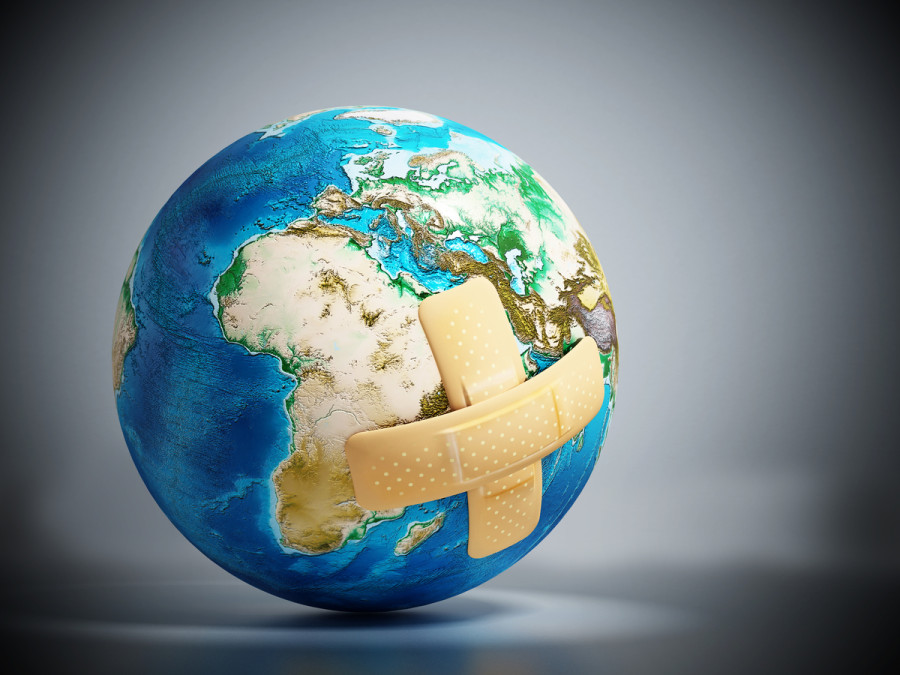Columns
Global problems require global solutions
Narrow nationalism will not protect us from global crises. But will we learn from the current pandemic?
Naresh Koirala
The continuing spread of the novel coronavirus (SARS-CoV-2) has pushed the world to the edge. At the time of writing, the virus has infected over 558,000 people in nearly 177 countries and nearly 25,500 of them have died from Covid-19, the disease SARS-CoV-2 creates. There is panic everywhere. Even countries with a very low number of identified infections are reeling under its economic impact. Nepal claims it has only a few infections and only one death, yet the country is in lockdown. Its economy, already in dire straits, is in tatters. No country is safe.
Pandemics are not a one-time event. They reoccur every so often. They strike unannounced and do their damage during the clinically blind period—the period between developing vaccines and their first strike. Managing them during the blind period is always challenging but it gets doubly difficult when the virus spreads and kills as fast as SARS-CoV-2 does.
We cannot stop the recurrence of pandemics but we can minimise the damage they inflict by preparing for them and advancing global cooperation. It is instructive to revisit the history of the last big pandemic, the Spanish flu, before we discuss strategies to reduce future pandemic damage.
Free rein
The Spanish flu lasted from 1918 to 1920. It killed 50 to 100 million people worldwide. It was detected when the First World War was still raging. The war was fought from deep, narrow, long crowded trenches crammed with soldiers. The proximity of the soldiers in the trenches and their transportation to the location in ships created an environment conducive to the spread of the virus. There was no vaccine. Soldiers returning home after the war became carriers and agents of the flu’s resurgence in their home countries.
An infectious virus has free rein to infect and kill until a vaccine to neutralise it is available. Flu vaccines were not developed until the mid-1930s.
The development of vaccines presents many challenges. To be effective, the vaccine must contain specific proteins of the pathogen, called antigens. The antigens elicit an immune response from our body yet do not cause infection. They are created by the virus’s unique genetic code. This genetic code replicates; mutates and evolves. Decoding the genetic code is a complex process, but it is a prerequisite to developing an effective vaccine. Once the decoding is complete and the vaccine is developed, it has to be tried and tested at different levels before it can be made available for public use. Development takes up to a year or longer. Without the immunisation of the population by a suitable vaccine, it is impossible to rid the virus unless it dies on its own.
The Spanish flu (and other pandemics before that) taught us that proximity of the people is the primary facilitator of infection. The infection records of SARS-CoV-2 corroborate it. The number of infected in big cities vastly exceeds those in rural areas.
Isolation or quarantine, which create a physical space between people, is a temporary solution to stop healthcare facilities from being overwhelmed by the surge in the number of the sick. Its practice goes back to the 14th century when Europe was fighting the Black Plague. A lockdown does not get rid of the virus. The lifting of the shutdown may resurrect its spread. Also, a long shutdown may paralyse the economy beyond repair. Already, the Covid-19 shutdown has resulted in a free fall of stock markets around the world; billions of dollars have vanished and tens of thousands have lost their jobs.
Time for reflection
No one knows the toll Covid-19 will take before it ends. Marc Lipsitch, a Harvard University Epidemiologist, says the SARS-CoV-2 may infect between 40 to 70 percent of the world’s adult population. This means up to 11 million people may die.
Urbanisation, global travel and global interconnectivity have reduced the physical space between people, facilitating people-to-people viral transmissions. The belief that a one-way upward trajectory of perpetual economic growth and mindless consumerism is the only way to a fulfilling, happy life has resulted in irreparable environmental degradation. All in all, we have created openings for many future disasters of global proportions, other than public health pandemics. Climate change, environmental degradation, waste management, and cybersecurity are others. None of these waiting-to-happen disasters respect national boundaries.
Even manufacturing, with complex supply chains, has become an interconnected global activity that transcends national borders. Covid-19 has shown that a medical pandemic is more than a public health crisis—it is also an economic crisis of global proportions.
The impact of SARS-CoV-2 has demonstrated the fragility of the current world order. The disruption in one element of the system (public health) has created a domino effect we are unable to manage. Thomas Homer-Dixon, a known academic and researcher, was the first to recognise the growing complexity of the world order and question our ability to manage it. In his 2000 book The Ingenuity Gap, he argued that ‘the nature of problems faced by our society is becoming more complex and that our ability to implement solutions is not keeping pace.’
Global problems need global collaboration, mutual trust, the timely and free exchange of medical and scientific information, and governments that people can trust. Above all, a simpler society—one not driven by mindless consumerism—is needed. Major countries around the world are currently engaged in research to develop the Covid-19 vaccine. Imagine how expeditious the project would be if they collaborate instead of working in isolation.
The benefits of a simpler life—no cars and much-diminished invasion of nature’s space—is already apparent in the significantly reduced carbon emissions in China and Italy; from the return of blue skies in Wuhan and of dolphins and ducks in the waters around Venice.
Unless we change our course—prioritise global stability over short-term national agenda—and work together as global citizens, future pandemics may damage us beyond repair, recovery and redemption. Narrow nationalism will not protect us from global problems.
Alas, global solidarity sounds like a far cry from today’s world dominated by the likes of Donald Trump, Boris Johnson, Xi Jinping and Narendra Modi, all of whom are engaged in a game of one-upmanship.




 8.12°C Kathmandu
8.12°C Kathmandu















